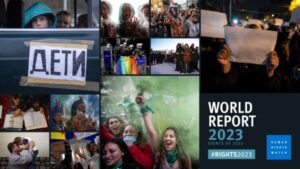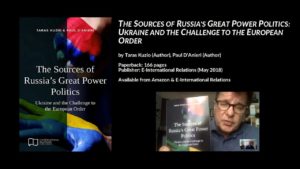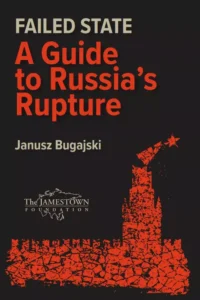Russia’s mythmaking—about its place in the world and the role Ukraine plays in its history—has made the world a more dangerous place, Foreign Affairs observes. Russian President Vladimir Putin is the chief storyteller—and his version of events has even warped American thinking about Ukraine. Why didn’t the West react more forcefully in 2014, when Russia first violently took Ukrainian territory? Why is Ukraine’s post-Soviet history so different from Russia’s? And what can Ukrainians teach Americans about democracy?
Yale University’s Timothy Snyder discusses what’s at stake in Ukraine, what a Ukrainian victory might look like, and why using the word “stalemate” to describe the war is misguided.
 The tragedy of Russia’s invasion of Ukraine also demonstrated that the “full global human rights system” could be activated swiftly, said Tirana Hassan, acting executive director of Human Rights Watch.
The tragedy of Russia’s invasion of Ukraine also demonstrated that the “full global human rights system” could be activated swiftly, said Tirana Hassan, acting executive director of Human Rights Watch.
“Amongst the fog of war and the darkness that we have seen in this war in Ukraine, there has been a shining light,” she told AFP. After years of “half-hearted” aid to civilians facing threats in other countries, “the world’s mobilization around Ukraine reminds us of the extraordinary potential when governments realize their human rights responsibilities on a global scale,” Hassan wrote in the preface to the group’s global assessment of 2022.
“2022 has shown us is there are cracks in the authoritarian armour,” said Hassan. “There has been a rising up of the people who have expressed their commitment, their desire and their demand to have human rights realized.”
 The relationship between Ukraine and the country’s Western partners is very much a two-way street bringing significant benefits and strategic advantages to both sides, argues Taras Kuzio (right), a professor at the National University of Kyiv Mohyla Academy and author of the forthcoming “Russia’s War and Genocide Against Ukrainians.”
The relationship between Ukraine and the country’s Western partners is very much a two-way street bringing significant benefits and strategic advantages to both sides, argues Taras Kuzio (right), a professor at the National University of Kyiv Mohyla Academy and author of the forthcoming “Russia’s War and Genocide Against Ukrainians.”
While Ukraine is receiving critical military and economic support, the Western world is benefiting from improved security along with important intelligence and unique battlefield experience. There is clearly a strong moral case for standing with Ukraine, but it is worth underlining that the strategic argument is equally convincing, he writes for the Atlantic Council.
 We are currently witnessing an unfolding revolution in global security that Western policy makers are clearly unprepared for — the impending collapse of the Russian Federation, according to Janusz Bugajski, a senior fellow at the Jamestown Foundation and author of Failed State: A Guide to Russia’s Rupture.
We are currently witnessing an unfolding revolution in global security that Western policy makers are clearly unprepared for — the impending collapse of the Russian Federation, according to Janusz Bugajski, a senior fellow at the Jamestown Foundation and author of Failed State: A Guide to Russia’s Rupture.
Instead of planning contingencies for external spillovers and capitalizing on Russia’s de-imperialization, however, Western officials appear to be stuck in a bygone era, believing they can return to the post-Cold War status quo, with some even offering Moscow security guarantees to keep the country intact, he writes for POLITICO. Openly backing pluralism, democracy, federalism, civil rights and the autonomy of its republics and regions can help embolden Russia’s citizens by demonstrating they aren’t globally isolated.
The democratic world failed to deter a Russian attack on Ukraine — we must not make the same mistakes with China, says former Nato secretary-general Anders Fogh Rasmussen. We must learn the right lessons from the war in Ukraine to prevent one in the Taiwan Strait, he writes for The Financial Times:
- The first lesson is that Ukraine remains a free country because its people were prepared to fight…. The decision by the Taiwanese President to extend military service from four months to one year is important. It sends a signal that Taiwan is serious about its own defence and its people are willing to fight for a free and democratic future.
- The second lesson is the importance of a strong and unified response from the democratic world. ….Democratic leaders must make clear that any attempt by China to forcibly change the status quo in Taiwan would spark an equally unified response. …
- Third, ultimately weapons are what counts. Ukraine managed to stop the initial Russian invasion and turn the tide of the war thanks to the supply of superior military equipment from its allies, particularly the US. ….. That lesson is even more important for Taiwan, whose island geography will be difficult to resupply in a time of war….
- The final and most important way to deter a Chinese move on Taiwan is to ensure a Ukrainian victory in the current conflict.
 The decline of democracy worldwide is not inevitable, adds Foreign Policy. State actors and other stakeholders have a range of tools that can be leveraged to strengthen accountability, thwart corruption, and build – or rebuild – public trust. the following program, supported by the International Foundation for Electoral Systems, will explore strategies for establishing and enforcing state accountability in politically fragile environments around the world. The event will showcase experts and leaders from policy, civil society, and media, and will engage FP’s audience from around the world.
The decline of democracy worldwide is not inevitable, adds Foreign Policy. State actors and other stakeholders have a range of tools that can be leveraged to strengthen accountability, thwart corruption, and build – or rebuild – public trust. the following program, supported by the International Foundation for Electoral Systems, will explore strategies for establishing and enforcing state accountability in politically fragile environments around the world. The event will showcase experts and leaders from policy, civil society, and media, and will engage FP’s audience from around the world.
February 9, 2023 | Virtual 11:00 a.m. ET
Speakers
- Thomas Carothers, Senior Fellow and Co-Director, Democracy, Conflict, and Governance Program, Carnegie Endowment for International Peace
- Francis Fukuyama, Olivier Nomellini Senior Fellow, Freeman Spogli Institute for International Studies, Stanford University
- Maggie Lake, Veteran Journalist & Founder, Maggie Lake Media (Moderator)
Taiwan must not suffer the same fate as Ukraine https://t.co/urdR2GMivy
— Democracy Digest (@demdigest) January 12, 2023







